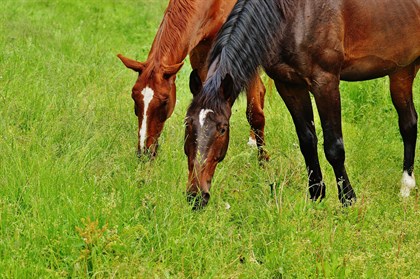
It is useful to know the MJ/kg your pasture is running at as the seasons change.
BY DAVID NASH
Over the last few months of winter, a question I am frequently asked is: How do I gain condition or weight on my horse?
Owners will diligently send me their horse’s current diet wondering why it is not gaining weight. To answer this very simply, it is a matter of calories. They are not being fed enough! You will need to feed your horse more! Many owners are feeding just enough – or not quite enough – energy to maintain their horse’s condition in their current state, let alone gain weight. To calculate the energy requirements of the horse, we will use a few basic equations that will help you estimate the amount of energy your horse requires and then calculate how much additional feed/energy it will require to gain weight. There are a few equations we can use, but we’ll use the most basic ones from the National Research Council to keep it simple.
Remember, these are only a guide as horses have different metabolisms and are under different environmental conditions. As always, I would suggest obtaining advice from your nutritionist or veterinarian.
On average, a 500kg horse can consume up to 15kg of feed per day.
EQUATION FOR MAINTENANCE ENERGY REQUIREMENTS PER DAY
DE (digestible energy) = ((1.4 + 0.03BW(kg)) x 4.185) MJ
BW = Bodyweight (e.g. 500kg)
E.g.
DE = ((1.4 + 0.03 x 500kg)) x 4.185)
DE = 68.63 MJ of energy per day
This is the amount of energy in megajoules (MJ), a unit of energy that an average, healthy 500kg horse needs to maintain its condition. If we increase its exercise or work rate, we will need to multiply our Maintenance Energy Requirement by a factor as shown below.
Light exercise: 68.63 x 1.25 = 85.8 MJ/day
Moderate exercise: 68.63 x 1.5 = 103 MJ/day
Intense exercise: 68.63 x 2 = 137.25 MJ/day
Once we have established an approximate amount of energy we require to maintain their current bodyweight if they are just idle in a paddock or performing in competition, we now need to work out how much energy we require for them to gain weight. A simple approximation is that for every kilogram of weight gain per day, I would double their maintenance energy requirement. That would mean to gain 1kg per day, your idle horse would need to consume as much energy as a horse performing intense exercise.
When looking to increase your horse’s condition, I would suggest setting targets. Slow and steady is the key to ensure you do not cause dramatic changes to your horse’s digestive bacterial population, as this can cause many problems that can negatively impact the health of your horse. It would be best to weigh your horse with scales or use weight tapes to estimate your horse’s weight, and compare this to a condition score chart to determine what your horse currently looks like versus your desired result. The link at the end of this article is an excellent piece from the Victorian Department of Agriculture on how to condition score your horse with approximate weights for horses of various heights and condition scores.
Once we have set a target and determined our energy requirements, you will need to know the energy level of the feed your horse consumes. Obviously pasture is the first nutrient source we can look at. Your pasture nutrients change with the growing season so it is wise if you are large enough to test your pasture during the four seasons to know what nutrients your pasture is providing to your horse. If not, consult your nutritionist, Department of Agriculture extension officer or agronomist who will be able to provide you with a reasonably accurate estimate. Commercial supplementary feeds should have the energy levels on the back of their bag along with many other important nutrients. The internet is also a good approximation for nutrient levels of raw materials such as oats and roughages such as hay and chaff.
Many horses will require energy-dense feeds such as supplementary commercial feeds, fats and grains in order to gain weight.
When designing a diet you need to ensure your horse is capable of consuming this amount of feed. Horses are capable of consuming 2.5-3 per cent of their bodyweight per day in dry matter form. This means our 500kg horse can consume up to 15kg of feed per day. If our pasture is running at 12MJ/kg at this time of year (spring) our horse will only need to eat 11.5kg of pasture to gain 1kg of bodyweight per day. However, if we have poor pasture quality in summer and the energy level is around 6MJ/kg, your horse will need to eat nearly 23kg of feed per day. Remember, your horse can only consume approximately 15kg per day so there is no way with just pasture your horse can gain significant weight. You will need to add energy-dense feeds such as supplementary commercial feeds, fats and grains to supplement the natural feed sources available.
I cannot express enough that this example of gaining weight is a very simplified explanation of the role energy intake plays in assisting the horse to maintain and gain weight. It does not take into account the type of energy (carbohydrates, fats etc.), how horses react, or the requirement of protein and other nutrients and the role they play. It is meant to show people how much feed is actually required to gain weight on an average horse. An additional cup or two of a secret potion feed will not do the job effectively.
A final note is that all other nutrients are extremely important in developing a healthy, functional diet; thus I would strongly suggest when formulating a diet, consult a nutritionist to ensure your target diet is safe and balanced.
For more information regarding how to condition score your horse, with approximate weights for horses of various heights and condition scores, see:
READ THE LATEST NEWS ARTICLES HERE
https://www.equestrianlife.com.au/articles/Dining-by-the-numbers

